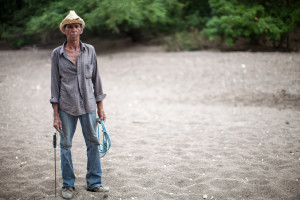
Bernardo Anastasio Hernández, a cattle farmer, stands on the dry river bed of the Río Grande at San Francisco Libre. Drought is affecting large areas of Central America. Across Nicaragua hundreds of cattle are dying, wells are drying up and the harvests have failed.
(Pictured: Bernardo Anastasio Hernández, a cattle farmer, stands on the dry river bed of the Río Grande at San Francisco Libre in Nicaragua. Drought is affecting large areas of Central America, where hundreds of cattle are dying, wells are drying up and the harvests have failed. Credit: ACT Alliance/Sean Hawkey)
Cattle have died and crops have been completely diminished in a drought across Central America that is recorded as the region’s worst dry period in the last 30 years. The drought has impacted more than 2.5 million people across the region. Three countries that are feeling deep impacts of this drought include El Salvador, Honduras and Nicaragua, where crops are either completely depleted or prices for grains have increased so significantly that many families cannot afford to purchase them. The drought is causing concerns for food security and livelihoods.
Lutheran Disaster Response, working with Lutheran World Federation, is assisting in early recovery and livelihood restoration through the installation of family gardens, farm plots, micro-irrigation systems and training workshops.
Family gardens: Family garden plots will be installed to assist 450 families in El Salvador, 100 families in Honduras and 200 families in Nicaragua. The garden plots will be used in areas where yield is ensured so families have access to food without having to worry about high costs.
Farm plots: In Honduras and Nicaragua, farm plots will be implemented in areas for corn and bean production. Short-cycle (native) varieties will be used to ensure yield during the short rainy season without having to worry about long-term water shortage difficulties.
Micro-irrigation systems: Water supply systems will be established to support family gardens and farm plots in Honduras, El Salvador and Nicaragua. A total of 120 micro-irrigation systems will be installed in priority areas.
Training workshops: In order to establish the projects listed above, training workshops will be provided to ensure the success of the family gardens, farm plots and water management systems.
We will continue to walk with and pray for our brothers and sisters in Central America as they work through the difficulties caused by the drought. If you would like to support Lutheran Disaster Response’s work in Central America, please visit theLutheran Disaster Response giving page.
